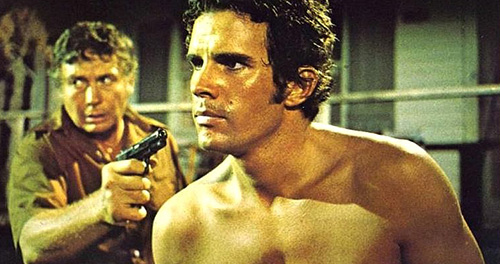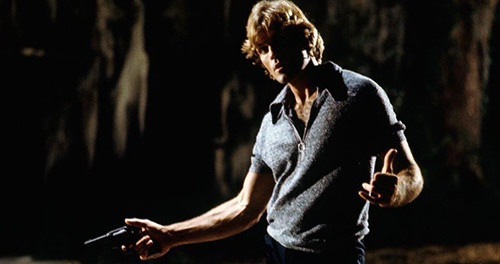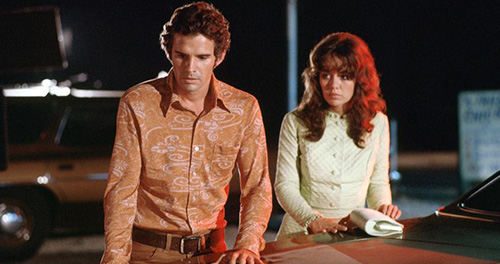[6]
Dack Rambo and Rebecca Dianna Smith star as a young couple who playfully escape their wedding party and retreat to a hotel in the Louisiana bayou where they accidentally witness a murder and become the killers’ next targets. After an initial attack in which Smith is raped, the couple find their relationship tested to the breaking point. Rambo decides to hunt down the killers for revenge while Smith tries to stop him, resulting in another sadistic showdown.
Nightmare Honeymoon is a somewhat interesting product of its time. It was released before the big horror/thriller boom of the 70s and 80s, so the execution is more matter-of-fact than what I was expecting from low-budget genre fare. It actually makes the film more unsettling at times, a little like Straw Dogs in its content and stylistic approach. But it also carries the baggage of 60s and early 70s gender norms and sociology, which makes Smith’s character a bit of a wimpy doll baby in the movie. Smith even has a conversation with her father (character actor Pat Hingle) where the two discuss how she doesn’t belong to her father anymore — she belongs to her husband. The film also deals with the responsibility of rape on the victim’s husband, and how he can’t possibly go on with life unless he exacts revenge on the men who ‘took’ his wife from him. Even though the film might feel out-dated in the way the characters behave at times, it’s still interesting to note the ways in which people haven’t changes that much since the time the film was released.

The film could benefit from stronger performances. Rambo is passable and Smith’s role is thanklessly written at times. John Beck, as the main baddie, is in full-blown villain mode the whole time and might have been scarier if he were more complicated. But I appreciate what this story is about and wish there were more movies involving rape and how people cope with its aftermath. A big chunk of Nightmare Honeymoon is about Rambo and Smith dealing with the fall-out. That section is the film’s most substantive and interesting. I also applaud the movie for dealing with rape without ever showing it. Nightmare Honeymoon is not a gory, bloody, or sexually explicit movie. But in its climax, Beck’s character terrorizes Smith’s into begging him to rape her again. That depiction of powerlessness and humiliation gets to the dark heart of the matter far more effectively than any graphic display of sexualized violence.
After watching Nightmare Honeymoon, I was interested to learn Nicolas Roeg (Don’t Look Now, Walkabout) was the film’s original director, but he was replaced very early in production with Elliot Silverstein (Cat Ballou, A Man Called Horse). It would be interesting to have seen Roeg’s vision for the material.


